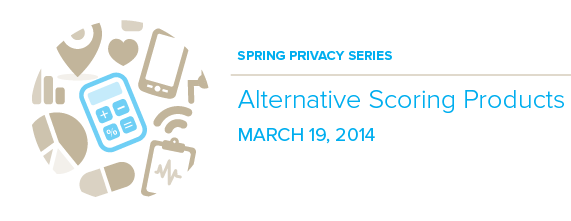former FTC Conference Center
601 New Jersey Avenue, NW
Washington
DC
20001
Event Description
On March 19, 2014, the Federal Trade Commission staff hosted a seminar on Alternative Scoring Products.
The speakers described a variety of predictive analytics products offered by many data brokers to predict trends and consumer behavior in a variety of contexts, ranging from identity verification and fraud prevention to marketing and advertising.
For example, companies are using scores to predict the likelihood that a person has committed identity fraud; the likelihood that a certain transaction will result in fraud; the credit risk associated with certain mortgage loan applications; whether contacting a consumer by mail or phone will lead to successful debt collection; whether sending a catalog to a certain address will result in an in-store or online purchase; the likelihood that an individual is taking his or her medication; a person’s presence on the Internet and his or her influence over others; or whether a customer is pregnant, and if so, when the baby is due.
According to media reports, these scores are determining whether transactions trigger further scrutiny, the kind of special offers that companies make to certain individuals (and those they don’t), and even whether the customer should speak to a high-ranking customer service agent at a company.
Consumers are largely unaware of these scores, and have little to no access to the underlying data that comprises the scores. As a result, these predictive scores raise a variety of potential privacy concerns and questions.
You can view an archived webcast of the event. A transcript of the proceedings is also available below.
STAFF CONTACTS:
- Andrea Arias (202) 326-2715
- FileAgenda (97.82 KB)
- FileSpeaker Bios (20.08 KB)
Pamela Dixon
Pamela Dixon is the founder and executive director of the World Privacy Forum. Her privacy research has been showcased in Congress, at the FTC, in the media, and has formed the basis for state and US national legislation, particularly in the area of health privacy. Dixon has written studies on consumer privacy, data brokers, online privacy, financial privacy, health privacy, and privacy self-regulation. Dixon has completed more than 7 months of research in Asia focused on emerging global privacy issues, including the use of biometrics and strong identity in developing nations. Her most recent book, co-authored with Bob Gellman, Online Privacy, was published by ABC-CLIO books.
Ed Mierzwinski
Ed Mierzwinski is the Consumer Program Director and Senior Fellow at the U.S. Public Interest Research Group. He often lectures or testifies before Congress, state legislatures, and agencies on a wide range of consumer issues, from credit card rates and privacy to product safety and airline passenger rights. He has published reports on numerous consumer issues, including internet privacy, identity theft, and credit reporting mistakes.
Claudia Perlich
Claudia Perlich is the chief scientist at Dstillery (previously m6d) and in this role designs, develops, analyzes, and optimizes the machine learning that drives digital advertising. Before joining m6d in February 2010, Perlich worked in the Predictive Modeling Group at IBM’s T.J. Watson Research Center, concentrating on data analytics and machine learning for complex real-world domains and applications. She also teaches in the Stern MBA program at NYU.
Stuart Pratt
Stuart Pratt is the President and CEO of the Consumer Data Industry Association, which includes businesses that provide companies with the data and analytical tools necessary to manage risk. Pratt has advised U.S. presidential and gubernatorial task forces on the importance of the free flow of information to the U.S. economy and testifies regularly before Congress.
Ashkan Soltani
Ashkan Soltani is an independent researcher and consultant focused on privacy, security, and behavioral economics. He has previously served as staff technologist in the Division of Privacy and Identity Protection at the Federal Trade Commission and also worked as the primary technical consultant on the Wall Street Journal’s “What They Know” investigative series.
Rachel Nyswander Thomas
Rachel Nyswander Thomas is the Executive Director of the Data-Driven Marketing Institute (DDMI) and Vice President of Government Affairs for the Direct Marketing Association (DMA). Thomas leads DDMI in conducting independent, academic research regarding how the responsible use of consumer data shapes industry and society, and as Vice President of Government Affairs, Thomas represents the data-driven marketing community’s policymaking interests on Capitol Hill, before key federal agencies and in multi-stakeholder policy forums.
Joseph Turow
Joseph Turow is the Robert Lewis Shayon Professor of Communication at the University of Pennsylvania’s Annenberg School for Communication. He has authored nine books, edited five books, and written more than 150 articles on mass media industries. His most recent book, from Yale University Press (early 2012), is The Daily You: How the New Advertising Industry is Defining Your Identity and Your Worth. Turow’s continuing national surveys of the American public on issues relating to marketing, new media, and society have received a great deal of attention in the popular press as well as in the research community.
-
Event Materials
FileWorkshop Slides (2.41 MB)
-
Transcript - Files
FileFinal Transcript (139.97 KB)FileTwitter Transcript (289.31 KB)
-
Location


Request for Comments
The Commission invited interested persons to submit written comments on issues related to this workshop by April 19, 2014. Interested parties were asked to address the following questions in their comments:
Comments That Were Submitted
You can view comments that were submitted at:
http://www.ftc.gov/policy/public-comments/initiative-546